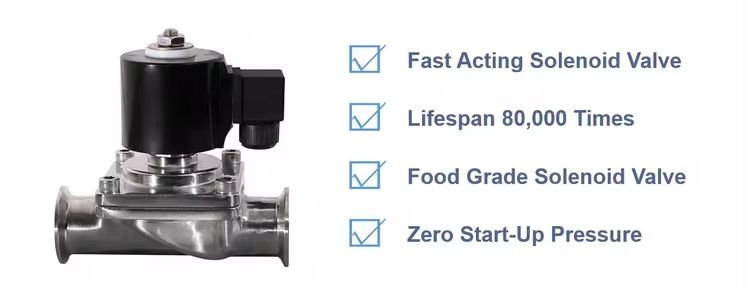แท็ก
ติดต่อเรา
การใช้งานและข้อดีของโซลินอยด์วาล์วสุขาภิบาล
- เช้าเจียง
วาล์วโซลินอยด์สุขาภิบาล เป็นส่วนประกอบที่จำเป็นในอุตสาหกรรมสมัยใหม่ โดยเฉพาะในภาคส่วนต่างๆ เช่น เภสัชกรรม การแปรรูปอาหาร และเทคโนโลยีชีวภาพ การออกแบบไม่เพียงแต่ปฏิบัติตามมาตรฐานด้านสุขอนามัยที่เข้มงวดเท่านั้น แต่ยังช่วยให้มั่นใจได้ถึงประสิทธิภาพการทำงานอีกด้วย บทความนี้จะสำรวจหลักการทำงาน การใช้งานหลัก ข้อดี และข้อควรพิจารณาเมื่อเลือกโซลินอยด์วาล์วสุขาภิบาล เพื่อให้เข้าใจอุปกรณ์สำคัญนี้อย่างครอบคลุม
หลักการทำงานของโซลินอยด์วาล์วสุขาภิบาล
วาล์วโซลินอยด์สุขาภิบาล ทำงานโดยใช้แรงแม่เหล็กไฟฟ้าเพื่อควบคุมการเปิดและปิดวาล์ว โครงสร้างพื้นฐานประกอบด้วยตัววาล์ว แกนวาล์ว สปริง และขดลวดแม่เหล็กไฟฟ้า เมื่อกระแสไฟฟ้าผ่านขดลวด สนามแม่เหล็กจะถูกสร้างขึ้นเพื่อขับเคลื่อนแกนวาล์วให้เคลื่อนที่ จึงทำให้วาล์วเปิดหรือปิดได้ การออกแบบนี้ช่วยให้ตอบสนองได้รวดเร็ว ทำให้การไหลของของไหลมีประสิทธิภาพ
ในอุตสาหกรรมอาหารและยา โซลินอยด์วาล์วสุขาภิบาลมักทำจากสเตนเลสสตีลซึ่งมีพื้นผิวเรียบเพื่อการทำความสะอาดที่ง่ายดายและเป็นไปตามข้อกำหนดด้านสุขอนามัย ผลิตภัณฑ์หลายชนิดผ่านการบำบัดพิเศษ เช่น การขัดด้วยไฟฟ้า เพื่อลดความเสี่ยงในการเจริญเติบโตของแบคทีเรีย
การใช้งานหลักของโซลินอยด์วาล์วสุขาภิบาล
1. อุตสาหกรรมอาหาร
ในการแปรรูปอาหาร โซลินอยด์วาล์วที่ถูกสุขอนามัยถูกใช้กันอย่างแพร่หลายเพื่อควบคุมการไหลของของเหลว เช่น นม น้ำผลไม้ และเบียร์ โดยการควบคุมอัตราการไหลและแรงดันอย่างแม่นยำ วาล์วเหล่านี้จึงช่วยรักษาคุณภาพและความปลอดภัยของผลิตภัณฑ์ นอกจากนี้ การออกแบบแบบปิดผนึกยังช่วยป้องกันการปนเปื้อนได้อย่างมีประสิทธิภาพ ซึ่งเป็นไปตามมาตรฐานสุขอนามัยอาหาร
2. อุตสาหกรรมยา
ภาคเภสัชกรรมมีข้อกำหนดด้านสุขอนามัยที่เข้มงวดสำหรับอุปกรณ์ โซลินอยด์วาล์วสุขอนามัยมีความสำคัญอย่างยิ่งในการควบคุมของเหลวต่างๆ รวมถึงตัวทำละลาย สารทำความสะอาด และวัตถุดิบยา การออกแบบของโซลินอยด์วาล์วช่วยให้ปิดผนึกได้ดีเยี่ยมภายใต้อุณหภูมิและแรงดันสูง หลีกเลี่ยงการปนเปื้อนข้าม และรักษาความบริสุทธิ์ของยา
3. เทคโนโลยีชีวภาพ
ในด้านเทคโนโลยีชีวภาพ วาล์วโซลินอยด์สุขาภิบาลควบคุมการไหลของอาหารเลี้ยงเชื้อและของเหลวอื่นๆ การควบคุมการไหลที่แม่นยำมีความจำเป็นสำหรับกระบวนการเพาะเลี้ยงเซลล์และปฏิกิริยาชีวภาพ วาล์วเหล่านี้ให้การทำงานที่รวดเร็วและเชื่อถือได้ ช่วยเพิ่มประสิทธิภาพการผลิต
ข้อดีของโซลินอยด์วาล์วสุขาภิบาล
1. มาตรฐานด้านสุขอนามัยระดับสูง
วาล์วโซลินอยด์สุขาภิบาล ได้รับการออกแบบมาเพื่อให้เป็นไปตามมาตรฐานด้านสุขอนามัยสากล เช่น FDA และ 3A เพื่อให้แน่ใจว่าจะไม่มีการปนเปื้อนเกิดขึ้นระหว่างการควบคุมของเหลว คุณสมบัตินี้มีความสำคัญอย่างยิ่งในการใช้งานด้านอาหารและยา
2. การตอบสนองที่รวดเร็ว
โดยทั่วไปแล้ว ความเร็วการทำงานของโซลินอยด์วาล์วจะอยู่ที่ระดับมิลลิวินาที ซึ่งช่วยให้สามารถปรับอัตราการไหลของของไหลและแรงดันได้อย่างรวดเร็ว ความสามารถในการตอบสนองอย่างรวดเร็วนี้ช่วยเพิ่มประสิทธิภาพโดยรวมของกระบวนการ
3. ประสิทธิภาพการใช้พลังงาน
โซลินอยด์วาล์วสุขาภิบาลสมัยใหม่เน้นการอนุรักษ์พลังงาน โดยการปรับปรุงการออกแบบคอยล์แม่เหล็กไฟฟ้าและแกนวาล์ว ช่วยลดการใช้พลังงานในขณะที่ยังคงประสิทธิภาพที่เชื่อถือได้
4. การบำรุงรักษาที่ง่ายดาย
การออกแบบของ วาล์วโซลินอยด์สุขาภิบาล ช่วยให้การบำรุงรักษาและทำความสะอาดเป็นเรื่องง่าย ผลิตภัณฑ์หลายชนิดผลิตขึ้นเพื่อถอดประกอบและทำความสะอาดได้ ทำให้ผู้ใช้สามารถบำรุงรักษาเป็นประจำและยืดอายุการใช้งานของอุปกรณ์ได้
ปัจจัยที่ต้องพิจารณาเมื่อเลือกโซลินอยด์วาล์วสุขาภิบาล
1. แรงดันการทำงานและอุณหภูมิ
เมื่อเลือกโซลินอยด์วาล์วสุขาภิบาล สิ่งสำคัญคือต้องพิจารณาสภาพการทำงาน รวมถึงแรงดันและอุณหภูมิ การใช้งานที่แตกต่างกันมีข้อกำหนดที่แตกต่างกัน ดังนั้นการเลือกรุ่นที่เหมาะสมจึงเป็นสิ่งสำคัญ
2. การเลือกใช้วัสดุ
วัสดุของโซลินอยด์วาล์วสุขาภิบาลส่งผลโดยตรงต่ออายุการใช้งานและประสิทธิภาพด้านสุขอนามัย สแตนเลสเป็นวัสดุที่นิยมใช้มากที่สุดเนื่องจากทนทานต่อการกัดกร่อนและทำความสะอาดง่าย
3. ประเภทการเชื่อมต่อ
วาล์วโซลินอยด์สำหรับสุขภัณฑ์มีประเภทการเชื่อมต่อหลากหลาย เช่น แบบเกลียวและแบบหน้าแปลน การเลือกประเภทการเชื่อมต่อที่เหมาะสมตามสภาพแวดล้อมในการติดตั้งจะช่วยเพิ่มความสะดวกสบายและความปลอดภัย
4. แบรนด์และคุณภาพ
การเลือกใช้แบรนด์ที่มีชื่อเสียงมักจะรับประกันคุณภาพที่สูงขึ้นและบริการหลังการขายที่ดีกว่า ชื่อเสียงของแบรนด์และการสนับสนุนด้านเทคนิคของผลิตภัณฑ์สามารถบรรเทาความกังวลของผู้ใช้ได้
บทสรุป
วาล์วโซลินอยด์สุขาภิบาล มีบทบาทสำคัญในอุตสาหกรรมสมัยใหม่ โดยมีการใช้งานที่หลากหลายและข้อได้เปรียบที่โดดเด่นทำให้เป็นส่วนประกอบที่ขาดไม่ได้ในระบบควบคุมของไหล เมื่อเลือกวาล์วโซลินอยด์สุขาภิบาล ผู้ใช้ควรพิจารณาเงื่อนไขการทำงาน วัสดุ ประเภทการเชื่อมต่อ และชื่อเสียงของแบรนด์เพื่อให้มั่นใจถึงประสิทธิภาพและความน่าเชื่อถือในการใช้งานจริง ในขณะที่เทคโนโลยียังคงก้าวหน้าต่อไป วาล์วโซลินอยด์สุขาภิบาลก็พร้อมที่จะแสดงคุณค่าและศักยภาพเฉพาะตัวในสาขาอื่นๆ มากขึ้น


